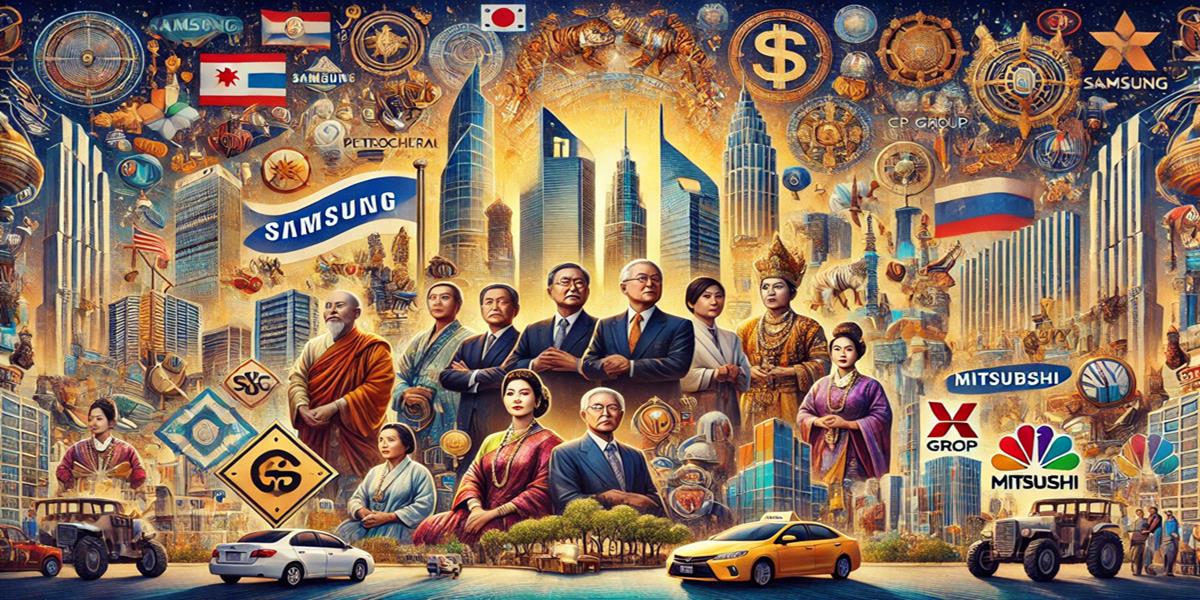Asia, too, has its share of powerful families who have played pivotal roles in the region’s economic development. These families are financial powerhouses and cultural and political forces in their respective countries.
Here’s a look at some of Asia’s most influential families who have been as impactful in their region as the Rothschilds have been in Europe.
1. The Lee Family (Singapore)
Legacy of Leadership and Commerce- Net Worth: Approximately $6.3 billion
- Source: The family’s wealth primarily comes from their stake in OCBC Bank, Singapore’s second-largest bank by assets.
The Lee family’s influence in Singapore extends beyond finance to governance and nation-building. Founding Prime Minister Lee Kuan Yew laid the foundation for Singapore’s rise as a global financial hub.
Beyond politics, the family’s influence reaches into Temasek Holdings and GIC, two of the world’s largest sovereign wealth funds.
These institutions have helped shape global investment strategies while solidifying Singapore’s position as a financial powerhouse in Asia.
2. The Ambani Family (India)
Pioneers of Industry and Innovation- Net Worth: Approximately $119.5 billion
- Source: Reliance Industries Limited, a conglomerate with interests in petrochemicals, oil and gas, telecommunications, and retail.
In India, the Ambani family is synonymous with wealth and industrial growth. Founded by Dhirubhai Ambani, Reliance Industries has become a titan in sectors ranging from petrochemicals to telecommunications.
Mukesh Ambani, now at the helm, has transformed Reliance into a global entity, with Reliance Jio revolutionizing India’s digital landscape.
The Ambanis are not just business magnates; their influence shapes India’s economic policies and consumer culture.
3. The Chearavanont Family (Thailand)
Agriculture to Conglomerate Powerhouse- Net Worth: Approximately $30.2 billion
- Source: Charoen Pokphand Group, a conglomerate with businesses in agribusiness, retail, and telecommunications.
The Chearavanont family, founders of the Charoen Pokphand (CP) Group, are giants in the agro-industrial and telecommunications sectors.
What began as a seed trading company in the 1920s has grown into one of the largest conglomerates in Asia, with operations spanning over 21 countries.
Their reach extends beyond Thailand, influencing food security, technology, and retail throughout Asia.
4. The Kwok Family (Hong Kong)
Real Estate Royalty- Net Worth: Approximately $28.6 billion
- Source: Sun Hung Kai Properties, one of Hong Kong’s largest property developers.
The Kwok family, through Sun Hung Kai Properties, has built some of Hong Kong’s most iconic skyscrapers and shopping centers.
As one of the city’s wealthiest families, their role in shaping Hong Kong’s skyline and real estate market is unparalleled.
Their influence is felt across Asia, as they’ve expanded their footprint into mainland China and beyond.
5. The Mitsubishi Zaibatsu (Japan)
A Legacy of Industrial Innovation- Net Worth: Approximately $67.76 billion
- The Mitsubishi family is one of Japan’s legendary zaibatsus, dating back to the 19th century.
They started in shipping but expanded into banking, manufacturing, and energy.
Today, the Mitsubishi Group encompasses over 40 companies, including Mitsubishi Bank, Mitsubishi Motors, and Mitsubishi Electric.
Their reach is global, and their influence on Japan’s industrial and economic policies rivals any financial dynasty in the West.
6. The Lee Family (South Korea)
Tech Titans- Net Worth: Approximately $26.6 billion
- Source: Samsung Group, a multinational conglomerate known for its electronics division.
South Korea’s Lee family, founders of Samsung, are a cornerstone of the nation’s economy.
Samsung’s dominance in electronics, semiconductors, and smartphones has made South Korea a global technology leader.
The family’s influence extends beyond business, shaping South Korea’s economic policies and technological advancements.
7. The Sy Family (Philippines)
Retail and Real Estate Magnates- Net Worth: Approximately $16.6 billion
- Source: SM Investments Corporation, with interests in retail, banking, and property.
The late Henry Sy built SM Investments Corporation into one of Southeast Asia’s largest conglomerates, dominating retail, real estate, and banking in the Philippines.
Known for their shopping malls and commercial properties, the Sy family has played a significant role in modernizing the country’s urban landscape and consumer economy.
8. The Cheng Family (China)
Global Financial Players- Net Worth: Approximately $22.5 billion
- Source: Chow Tai Fook Enterprises, with businesses in jewelry, property development, and investments.
In China, the Cheng family, founders of Chow Tai Fook Enterprises, are key players in luxury goods and property development.
They’ve expanded into finance, hospitality, and energy, with a global footprint that includes investments in Europe and North America.
Their influence in China’s economic and cultural sectors rivals any Western counterpart.
Shaping Asia’s Financial and Cultural Landscape
These families have defined industries, reshaped economies, and influenced the very fabric of society in Asia.Like the Rothschilds in Europe, their stories are a mix of ambition, strategy, and legacy. Their influence extends beyond financial markets, touching on governance, culture, and innovation, making them central to Asia’s development on the global stage.
Asia’s powerful families may operate in different industries and cultural contexts, but their impact mirrors the Rothschilds’ legacy in Europe — shaping the course of economic and social history for generations.

Nepotism or Genius? 🤔 Inside the Lives of Bernard Arnault’s 5 Kids Running the World’s Biggest Luxury Empire

How did a missing Super Bowl clip inspire the creation of YouTube? From a simple dinner party question to a global video-sharing giant. Discover the story of YouTube's creation and how its founders are shaping the future of tech.

Bernard Arnault, the mastermind who redefined luxury. From just a vision to becoming a powerhouse in the fashion world, Arnault's journey is nothing short of inspiring. Get ready to uncover the story of a man who not only built an empire but also changed the way we see luxury and style!

Explore the path to success of Shopify, the e-commerce platform empowering businesses to thrive online.

The remarkable story of two Chinese brothers who turned a humble tea shop into a billion-dollar empire.

Learn the milestones of NVIDIA, from gaming dominance to AI innovation, and envision its exciting future in global technology.

